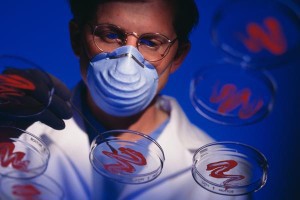 If you enjoy science, research and interacting with people, you may want to learn more about what an epidemiologist does. This public health official investigates disease, as well as what causes disease and various injuries in human beings, according to US News and World Report. It’s a job that is in high demand, pays well and offers potential for growth. You will be providing a valuable service to your community and the world with the work that you do.
If you enjoy science, research and interacting with people, you may want to learn more about what an epidemiologist does. This public health official investigates disease, as well as what causes disease and various injuries in human beings, according to US News and World Report. It’s a job that is in high demand, pays well and offers potential for growth. You will be providing a valuable service to your community and the world with the work that you do.
More About Epidemiologists
Epidemiologists not only study disease, they work to bring about improved health policy and community education in order to reduce the risks and spread of disease They may direct, plan and implement studies that address serious issues to public health and discover ways to deal with and prevent recurrence of the issue. In order to determine the causes of disease, they often interview people, make observations and collect surveys as means of collecting pertinent data. This data will then be shared with important players such as policy makers, health practitioners and the public. Epidemiologists also analyze data, monitor public health issues and plan programs to address the issues.
Characteristics of Epidemiologists
There are a number of characteristics and attributes an epidemiologist should possess. First, you should be a strong communicator if you hope to pursue a career in epidemiology. You will need to convey information to the public regarding often complex and frightening health issues, as well as to be able to communicate clearly with colleagues and supervisors. Critical thinking is necessary in order to understand and analyze the data you gather through research. You will also need to be very detail-oriented and accurate when conducting research in order to come to the correct conclusions. When designing studies and surveys, you’ll be required to utilize your math knowledge. One final example of a needed skill is to be able to teach others in order to effectively disseminate information to the public about health matters that affect them.
Nature of the Job
Much of your day as an epidemiologist will be spent gathering and analyzing data. You’ll use a variety of methods to obtain information and samples. You will often interview people or deliver surveys to groups. You’ll also collect actual specimen like blood and tissue samples for analysis. You will also study and evaluate data relating to demographics in order to search for patterns among groups of people or geographic regions in order to determine if there is a greater risk of disease associated with a particular segment of the population.
Education and Training
In order to become an epidemiologist, you’ll have to obtain at least a master’s degree, usually in public health with a specialization in epidemiology. In order to rise in ranks to become a study director or similar position, a Ph.D is needed. Classes you will take revolve around mathematics, biological sciences, survey design, statistical methods, research and causal analysis. Most master’s programs require an internship or other practical experience. Those who wish to pursue advanced research may even go on to become an MD.
Related Resource: Nursing Administration.
The field of epidemiology is ever-changing and provides challenges, as well as an outlet for improving society. An epidemiologist plays an important role in the maintenance of public health.